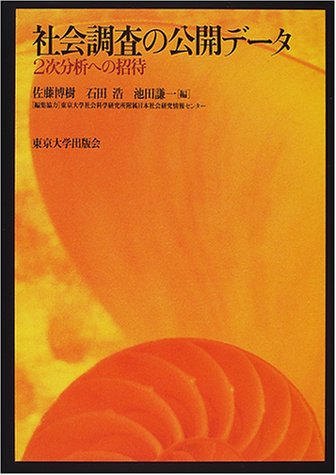1 0 0 0 98年参議院選挙における投票行動の分析:業績評価変数をめぐって
- 著者
- 池田 謙一
- 出版者
- Japanese Association of Electoral Studies
- 雑誌
- 選挙研究 (ISSN:09123512)
- 巻号頁・発行日
- vol.15, pp.109-121,188, 2000
本論文は社会心理学的な二つの投票行動モデルに基づき,1998年の参院選比例区での投票行動に対して,96年の政党スキーマ,98年の政治•経済の状況に対する「ソシオトロピック」な判断•内閣業績評価が及ぼす効果を検討したものである。用いたデータは1996-98年のJEDS全国パネル調査であり,分析の結果は仮説に支持的であった。<br>ここでは,業績評価が社会心理学的な視点から持つ意味,また業績評価や投票行動の規定要因としてのソシオトロピックな判断の持つ意味を検討し,これらを踏まえて分析が行われ,業績評価が投票行動に効果を持つことが明瞭に示された。一方,ソシオトロピックな判断は内閣の業績評価に対しては米国と同様の効果を示したものの,投票行動に対しては異なる効果を持っていた。これらの結果は,個人の経済状況認知の持つ自己利害的な効果と関連させて考察された。
1 0 0 0 IR 図書館のラーニングコモンズの活用と騒音課題
- 著者
- 山田 覚 池田 謙一 梅井 美和 岡 奈津紀 荻 礼子 西岡 輝幸 西岡 ゆりや 西本 絵美 吉本 悠子 渡邊 桂子
- 出版者
- 高知県立大学
- 雑誌
- 高知県立大学紀要 地域教育研究センター・総合情報センター編 = THE BULLETIN OF UNIVERSITY OF KOCHI The Community Center for the Advancement of Education and Research And The Integrated Information Center Combined Issue (ISSN:21876444)
- 巻号頁・発行日
- vol.67, pp.1-12, 2018-03-02
- 著者
- 池田 謙一
- 出版者
- 日本マス・コミュニケーション学会
- 雑誌
- 新聞学評論 (ISSN:04886550)
- 巻号頁・発行日
- vol.37, pp.25-49,323-322, 1988
The comeback of the concept of the "powerful mass media" in The 1970's has not been based on an extensive criticism of the "limited effect model". The logic of the active audience implied in the latter effect model hat not been defeated or denied by this new wave. At the same time, the logic of audience passivity in the former concept cannot be retained fully if we examine why we should take "contingency conditions" into consideration. Views of powerfully effective mass media should be reconcilable with the active audience concept. In order to discuss this possibility of reconcilability, the author introduces the viewpoint of "information behavior". This viewpoint argues that, while we should investigate the characteristics of media information, and examine the process in which this is generated, we should also emphasize the audience's active information-processing. In this paper, the author especially examines from this standpoint the logic of audience motivation on the cognitive-psychological level, for the logic of motivation has occupied a key position in the "limited effect theories" and "use and gratification studies", but this position has not been based on any clear and general logic. Regarding the auditor as an active information-processor implies that he is constantly motivated to predict the future and the outcomes of alternatives in advance depending on his mental simulation ability. And in order to do that, in other words, to make this "expectancy" successfully, he actively selects and interprets information from his outer world. The second basic characteristic of human activities is that any activity, whether it is actual behavior or mental simulation, is more or less centrolled by three standards, i.e. causal appropriateness, needs suitability, and executability. Based on the arguments above, the hypothesis of selective exposure to information was examined. The auditor is not just one who seeks only cognitively consistent information, but also is an active information seeker who is motivated by firm belief, even if he is urged to expose himself to dissonant information. Our hypothesis is that this firm belief is formed by the three selection standards mentioned above, that is, selective exposure to and selective reliance on any information is performed in accordance with these standards. We have much supportive evidence already. We should also recognize that there exists "non-active" selectivity stemming from objective availability of media information or from non-intentional information-processing proclivities of the audience. Next, we have examined the logic of "use and gratification studies" from the same viewpoint, after proposing a new typology of information needs. Gratification behavior to satisfy any information need is controlled by expectancies generated by contents provided by the media. But ironically enough, this very active behavior to gratify promotes media or program dependence. This is a paradox in which audience active behayior leads to media or program dependency, and which is consistent with the contention of "powerful mass media" concept.
1 0 0 0 OA 会話を行う両者の関係性が、新規情報共有・共有情報言及動機による話題選択に与える効果の検討
- 著者
- 稲増 一憲 池田 謙一
- 出版者
- 日本社会心理学会
- 雑誌
- 社会心理学研究 (ISSN:09161503)
- 巻号頁・発行日
- vol.25, no.2, pp.103-112, 2009-11-30 (Released:2017-02-20)
In this research, the effects of interpersonal relationships, psychological intimacy, and frequency of conversation on the motive to share new information or refer to shared information were examined by means of a survey using topic selections of conversation. There are contradictory findings in previous research on whether intimacy promotes referring to shared information or unshared information, as the studies confuse psychological intimacy and frequency of interaction. The results of our sampling survey showed that psychological intimacy increased topic selection based on the motive to share new information while frequency of conversations increased topic selection based on the motive to refer to shared information. In addition, psychological intimacy and frequency of conversations had an interaction effect on topic selection based on the motive to share new information. The results indicate that psychological intimacy and frequency of interaction should be distinguished, as this will assist in eliminating the confusion in previous studies.
1 0 0 0 社会調査の公開データ : 2次分析への招待
- 著者
- 佐藤博樹 石田浩 池田謙一編
- 出版者
- 東京大学出版会
- 巻号頁・発行日
- 2000
1 0 0 0 OA 変動期における投票行動の全国的・時系列的調査研究
1 0 0 0 投票行動の全国的・時系列的調査研究
93年総選挙における投票行動を起点にして、その後の政治変動と、選挙制度改革が、有権者の政治的態度にどの様な影響を及ぼしているかを正確に知るためには、同一有権者に繰り返し質問するパネル調査が必要である。われわれ研究グループは、93年総選挙直前から96年総選挙直後まで、7回にわたって全国的なパネル調査を行い、有権者の意識と行動の変容を探った。7回に及ぶ全国的なパネル調査というのは世界的にも類がなく、その上、これらの調査が日本政治の重要な時期をカヴァーしているのは極めて貴重である。この一連の調査の結果、政権交代をもたらした有権者の投票行動と、その後の政治変動が有権者の政治意識にどのような影響を与えたかを明らかにすることができた。研究発表の全容については別紙を参照されたいが、前年度に引き続き本年度も、科学研究費出版助成を受けて、(1)蒲島郁夫『政権交代と有権者の態度変容』、(2)三宅一郎『政党支持の構造』、(3)蒲島郁夫他『JES IIコードブック』の3冊の研究書を出版した。
1 0 0 0 オンライン口コミの多様性の検討
1 0 0 0 情報行動論試論 : その理論的可能性の検討
- 著者
- 池田 謙一
- 出版者
- 東京大学
- 雑誌
- 東京大学新聞研究所紀要 (ISSN:05638070)
- 巻号頁・発行日
- vol.36, pp.55-115, 1987
